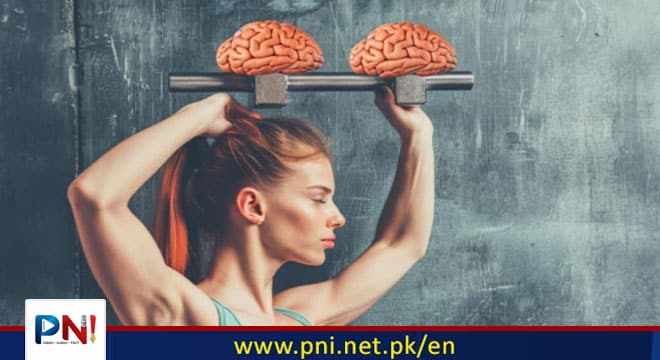ISLAMABAD, MAY 15 (ONLINE): Exercise can stimulate brain-boosting molecules when muscles are active, a new study found.
By innervating muscle-tissue models, researchers found that the same nerves that signal muscles to move can also send neurotrophic factors — a type of biomolecule — into the brain.
Some evidence suggests that exercise can reverse or delay the cognitive decline associated with aging, but experts say future studies should allow for time and variations among individuals to see how physical activity can affect this.
Exercise plays a role in brain health by triggering molecules involved in cognitive function to be released by muscles, a recent study has shown.
The study, published in Proceedings of the National Academy of Sciences, shows that when nerves that stimulate muscles are activated, they also send signals to the brain by secreting bioactive molecules and nanoparticles that enhance brain function.
The findings illustrate the importance of maintaining musculoskeletal health, not just for cardiovascular health or mobility, but also to counteract neurological degeneration, Hyunjoon Kong, PhD, Robert W Schafer Professor in the Department of Chemical and Biomolecular Engineering at the University of Illinois Urbana-Champaign, corresponding author of this study, told Medical News Today.
He explained that:
“Maintaining neuronal innervation is crucial for muscles to produce biological factors beneficial to the brain. With regular muscle contractions, muscles not only secrete these beneficial factors but also help sustain the innervation necessary for nerves to continue signaling muscles. This signaling is essential for regulating the release of neurotrophic factors into the brain.”
The study involved stimulating muscles with glutamate to see how nerve function would respond. Researchers used models of muscle tissue, one that was innervated and one that was not, and discovered that the innervated tissue sent more signals to the brain.
Since some of the neuron function in muscles can decrease with age or injury, researchers were interested in discovering how this loss would affect brain health.
How does exercise affect brain function?
In this study, the researchers did not observe people exercising. Rather, they looked at muscle models, meaning that it was not possible to draw immediate conclusions about particular forms of exercise and how they may vary in the way they interact with brain health.
Kong said that previous studies on exercise and brain health have found direct correlations between the size of the hippocampus and regular physical activity. But for this new study, the researchers examined the nervous system and musculoskeletal functions to achieve further understanding of brain-body interactions.
“Our study didn’t prove how exercise can improve cognitive function directly,” Kong cautioned. ”Several studies have already demonstrated that regular exercise can enhance cognitive function in adults. In these studies, participants were asked to do regular exercise, and the changes in the size of their hippocampi were monitored.”
“Findings indicate that individuals who perform aerobic exercises regularly tend to have larger hippocampi and exhibit improved performance on spatial memory tests. What we focused on was how neurons connected with muscle influence one of the cross-talk routes between muscle and brain.”
– Hyunjoon Kong, PhD
Ryan Glatt, CPT, NBC-HWC, senior brain health coach and director of the FitBrain Program at Pacific Neuroscience Institute in Santa Monica, CA, not involved in this research, told MNT that it would certainly take time to fully comprehend the effects of exercise on the brain, and future studies that used human participants would have to allow for that.
“The duration needed to observe the effects of exercise on cognitive function can vary based on the type, intensity, and frequency of exercise, as well as individual differences in age, baseline cognitive function, and health status,” Glatt said.
“Research typically indicates observable effects within a range of a few weeks to several months. It’s crucial for subsequent studies to consider these variables to accurately assess the timeframe,” he noted.
What types of exercise are best for brain health?
There are some notable benefits to regular exercise for brain health. Boxing, for example, has been used to help people with Parkinson’s disease.
Glatt acknowledged that certain forms of exercise may be more effective than others for enhancing brain health, especially activities that require cognitive function.
“Aerobic exercises, like running, swimming, and cycling, which improve cardiovascular health, are widely noted for their positive impacts on brain function,” he said.
“However, activities that combine physical and cognitive demands — such as dance and team sports — may offer additional benefits due to their requirement for coordination, rhythm, and executive functions,” he added.
Can exercise reverse or delay cognitive decline?
Kong suggested that physical activity can potentially reverse or delay the cognitive decline associated with getting older.
“As individuals age, they gradually lose the well-formed neuromuscular junctions between nerves and muscles, impairing the muscles’ ability to be regulated by nerve signals and subsequently reducing their capacity to secrete factors critical for brain function,” Kong explained.
“With appropriate training or stimulation for muscle contractions, muscles can produce factors that help maintain these neuromuscular junctions, thus preventing denervation. As a result, elderly individuals can still possess functional innervated muscles capable of producing important factors that enhance cognitive function in the brain,” he noted.
Glatt pointed out that a sedentary lifestyle, with relatively low levels of physical activity, can be associated with a higher risk of cognitive decline.
But he cautioned that there are a number of variations among individuals regarding genetics, lifestyle choices, and environmental factors.
“Exercise is increasingly recognized as a supportive intervention for individuals with compromised cognitive functions, including those affected by age-related declines or conditions like Alzheimer’s disease. Physical activity can enhance blood flow to the brain, reduce inflammation, and stimulate the release of growth factors, which may help to maintain or improve cognitive function,” Glatt said.
“While exercise is beneficial for maintaining cognitive health and potentially slowing the progression of decline, the evidence on its ability to reverse existing cognitive impairment is still inconclusive. Most studies suggest that exercise can contribute to a slower rate of decline and better overall brain health but reversing established cognitive deficits requires more extensive research,” he cautioned.
Is a flu vaccine with long-term effectiveness on the horizon?
White matter in superagers’ brains is less prone to aging and cognitive decline
How does extreme exercise affect lifespan? Study offers new insight
Could exercise be a potent weapon against neurodegenerative conditions?
There is increasing evidence that regular physical activity may help preserve our cognitive function in old age. Studies are showing that not only can exercise reduce the risk of neurodegenerative diseases, such as dementia and Parkinson’s, but it might also slow the progress of these diseases after diagnosis. But how does it work? Medical News Today asked experts why and how exercise might help keep the brain young.
How might exercise help protect against dementia, Parkinson’s disease, and similar conditions? Image credit: Take A Pix Media/Stocksy.
On average, we are living longer, but we may not be living healthier. According to European Union figures, women can expect, on average, 64.5 healthy life years (HLYs), and men, 63.5.
But life expectancy in the EU is just over 83 years for women and 77.5 for men. So, on average, a person can expect to spend around 15-20 years with some sort of health problem.
And most of those years of ill health are likely to be the later years of life, and many people will develop a neurodegenerative diseaseTrusted Source.
Estimates indicate that 14–18%Trusted Source of people over the age of 70 years in the United States have some form of cognitive impairment. And some 10% of people in the same age group in the U.S. have dementia, a number that rises to 33% of those over 90.
But there are ways to help extend your HLYs, and evidence is increasingly suggesting that regular physical activity may be one of the most effective ways to help your body and brain stay healthy for longer.
Follow the PNI Facebook page for the latest news and updates.








